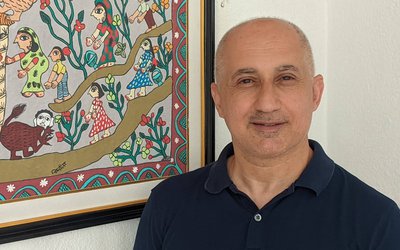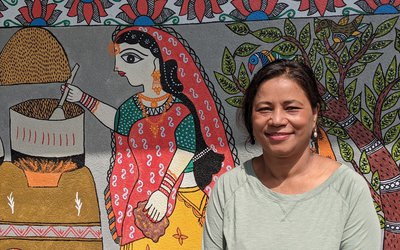
How do you see ADB’s involvement in hydropower sector in the context of its support to Tanahu Hydropower?
For Nepal, power sector development possibly opens for various development sectors. This is an important area. It will generate more opportunity for the people. So energy is a priority sector for ADB.
Do you think this project will be completed as per ADB and JICA’s plan?
This project is already two years behind due to problems encountered in the time of consultant selection. However, the five years' construction period will be completed in time by awarding contract to competent international contractors. Hopefully the construction period will shorten.
Have you started the selection of the contractor?
The selection process for the contractor will start very soon. The contract agreement will be signed early next year and the construction period will start the next year.
ADB also supported Kali Gandaki A project and it is now supporting Tanahu Hydropower. What differences do you find between them?
This is the Tanahu Hydropower dam site. Once the construction is completed, there is going to be a largest storage project of Nepal here. We are discussing other hydropower projects including Dudhkosi, Narsinggad. They are in the discussion stage. Asian Development Bank is also providing assistance to major transmission line projects including Kali Gandaki corridor, Marsyangdi corridor, Marsyangdi- Kathmandu and Tamakosi-Kathmandu. We are actively supporting Nepal's energy sector.
ADB has been working in Nepal for quite a long time supporting various projects. How do you see the progress of the projects?
Overall, there are tremendous challenges and opportunities in enhancing the capital expenditure. Country’s capital expenditure is now just 4 percent whereas it requires 8 to 12 percent. It is not only financial constraints but there are implementation constraints as well. Now Nepal’s capital expenditure is very low and it needs to be enhanced. ADB has been actively supporting Nepal government to increase the capital expenditure. More recently, we have started support on procurement issue.
How do you see the contribution of Himali Project in the remote parts of Nepal in poverty alleviation?
Himali project was launched to enhance value chain of potentially highly competitive products from the region connecting remote mountain districts of Kathmandu. The project progress is reasonably satisfactory. Now the value chain has been established and you have seen this from apple farms, yak cheese factory and trout farm. In this sense, what we see is value chain is facilitated with the production of Himali region exported to Kathmandu, Pokhara and other towns in terai. In the next step, we hope that the farmer’s products will be exported.
What is your impression on the project launched with support from ADB and Japan Poverty Fund for the upliftment of livelihood of marginalized community in Tanahu?
In a sense, this project is implemented as a pilot project to uplift the livelihood of marginalized and socially disadvantage group. The aim is to establish the local community institutions that self sustain and generate income through seed money and use the money to improve the livelihood. They are doing well but there remain challenges. Finally, the group will be able to push the barrier to reach the service delivery instructions of local level. There is also the need to improve the efficiency of local service delivery institutions. It is a step by step process and we cannot say that this is a one shot program. What I can say is that this project is provided as a good model to replicate in future.

Keshab Poudel
Poudel is the editor of New Spotlight Magazine.
- ECONOMY: Growth At 3.3
- Apr 16, 2024
- DPM’s SHRESTHA’S CHINA VISIT High Profile, Low Key
- Apr 14, 2024
- Maha Kumbha In Barahkshetra: A Sacred Festival In Sacred Koshi (Kaushiki) River
- Apr 09, 2024
- LOSS AND DAMAGE: Upper Tamakoshi A Case
- Apr 02, 2024
- Helvetas-Nepal’s InElam Promoting Herbal Oil In Sarlahi
- Mar 31, 2024
















